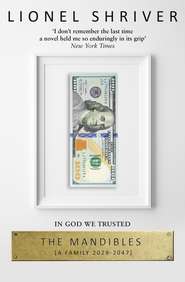По всем вопросам обращайтесь на: info@litportal.ru
(©) 2003-2024.
✖
The New Republic
Автор
Год написания книги
2018
Настройки чтения
Размер шрифта
Высота строк
Поля
“It was malicious,” said Martha primly. “He saw how close they were. Just like—” Martha glanced furtively around the room, then lowered her voice—“you know. Anyway, they wore each other’s clothes, finished each other’s sentences. Erin told me once that they sometimes had the same dreams. Now they despise each other, and Mary’s defected to Vanity Fair. It was tragic and he did it on purpose. Emotional vandalism, if you ask me.”
“Oh, don’t be so moralistic,” said Trudy. “Barrington got bored so Barrington slept around.”
“You should know,” said Ordway.
Trudy raised her chin. “But can you blame him? I wake up the day after he disappeared—or whatever, I’m too scared to think about it. I look around and think, I’m living in a dump. The food stinks, the beer stinks, you can’t even lie on the beach ’cause it’s too cold, not to mention the wind. I think, one more blast up my skirt, one more whoosh wrecking my hair and I’m booking for the States. Well, it didn’t seem that way before. With Barrington, Barba was exciting. Y’all feel the same way but won’t admit it.”
“Another beer, Kellogg?” asked Pyre.
“You just want to watch me commit hairy-peary again,” said Edgar.
The awful pun cast a pall.
“Barrington already used that line,” said Trudy, glaring.
“Definitely going to need that beer,” said Edgar, turning to fetch it himself. Jesus. Saddler had even beaten him to the jokes.
Edgar lingered by the drinks to look around. As if rendered freehand, everything in the room was subtly imperfect. The cushions’ needlework was lumped with tufty bits. The throw rug beneath Edgar’s feet included one aberrant purple stripe that, while it looked like a mistake, also electrified the pattern and was the sole reason the rug drew his eye. None of the picture frames was quite rectangular, and the original watercolors within were fraught with charming little errors in perspective. The ceramic tiles around the fireplace were crookedly inlaid. The pitcher on the drinks table canted to the left. Spearing a pickled onion, he noticed that the handles of the wooden hors d’oeuvre forks were whittled into animals, and it was impossible to tell if this one was a lion or a sheepdog.
At first Edgar assumed that Nicola was a boutiquey sort who shopped at import outlets, except these objects exhibited neither the soullessness of mass production nor the shoddiness of some arthritic Third Worlder hacking out cocktail forks for ten cents an hour. Rather, every curtain, upholstery job, and one-of-a-kind dessert plate bore the indelible imprimatur of the same gently perverse sensibility. Like Martha Hulbert’s frumpiness, the living room’s appointments were flawed on purpose.
When Nicola rearranged the sandwiches, Edgar commended, “You’re quite a cook.”
She sighed. “I’m afraid no one has much appetite tonight.”
“So—you a journalist yourself?”
“Gracious, no. I’m a housewife.” The admission was cheerful.
So rarely had Edgar met women in New York who confessed to doing nothing that he floundered for lack of follow-up. “To support you, and this house—which is big …”
“Not as big as yours.”
“It’s just, Henry must be doing okay.”
“I wouldn’t say that Henry’s okay.”
“Financially, I mean.” Instead of nosing into their bank statement he should have asked if she had kids, but he too badly didn’t want her to have any.
“Even financially,” Nicola reflected, “I’d not describe Henry as okay. In fact, Henry’s financial situation is woeful. That is, full of woe.”
Edgar was determined not to drop another clangor like, So you weave your own rugs because you can’t afford commercial ones. He held up the dog-lion end of his fork. “Is there anything in this house you didn’t make?”
Nicola scrutinized the room. “Of course. The wine glasses—I haven’t learned to blow glass yet, but I’d love to … And I didn’t make nearly all the furniture, because Henry put his foot down. It takes too long, and he didn’t want to eat off the floor.”
“This handicrafting. It’s some kind of policy, then?”
“I don’t have policies. I have whims. I’m a total child, Edgar. All I do is play. In adult terms, I’m a dabbler. I can’t explain, but there’s something about scooping lettuce from a salad bowl that you carved yourself. Preferably lettuce from your own garden, but nothing grows in this godforsaken province other than peras peludas.
“In our case, these whims of mine have proved a funny antidote. Henry has a closetful of designer silk and Italian suede, but he’s much safer walking around in hand-sewn cotton. If I had the time he’d wear cloth I wove as well—from thread I spun, from cotton I ginned, but obviously there are limits. A homemade shirt might not hang quite right, but it’s a kind of protection.” She hung her head. “The last few months he’s gone back to the Calvin Kleins. I don’t blame him, but I think it’s dangerous.”
“Why’s that?” Edgar was completely out of his depth.
“I’m talking about the conservation of meaning,” she said passionately. “When you’re young, you take significance for granted. In childhood, every silly clockwork donkey, or your first garish pink lipstick, is important. Then the problem is the opposite: you’re overpowered by meaning, drowning in it. But later … Well, I can’t go buy Henry a present, can I?”
Edgar could only intuit vaguely that they had money troubles.
“Barrington understood,” she added sadly. “But Barrington collected meaning like lint. Like that Peanuts character: it followed him in a cloud.”
“You’re the only one I’ve met so far who mentions him in the past tense.”
“It’s a discipline.”
“I hope your, um, circumstances don’t mean you’ll have to clear out of this house,” said Edgar. “It’s cool.”
“I’m sorry, I’ve misled you. You’re new here, you must be knackered after your long journey, and here I’m being coy. Don’t worry about our being evicted, Edgar. We own this house and five others all over Europe. But I’m a little tired myself. If you don’t mind, we won’t get into it now.”
Dismissed and disconcerted, Edgar drifted back to the knot of gossips in the corner, his gate a bit unsteady. He’d switched to Heineken but eyed the brown bottles of Choque, curiously magnetic. The stuff was awful, punishing, but, much like the subject of Mr. Saddler, inexplicably difficult to leave alone.
At least when Edgar rejoined the group they’d moved on, which was probably the work of the visiting German from Der Spiegel. In his fidgety silence, Reinhold Glück had seemed impatient with ceaseless scuttlebutt on someone he didn’t know. Serious and bespectacled, Glück was doing a feature comparing O Creme de Barbear with German neo-Nazis. Edgar recognized the tone before penetrating the German accent; liberal indignation whiffled with the same strident huffiness all over the world.
“It is nothing but racism!” said Glück.
“We’re not talking about a handful of funny-sounding visitors,” said Trudy, crossing her legs. “What about all those Turks in Germany? What if there were more Turks than Germans? If they could vote your prime minister out of office—”
“Chancellor,” said Martha.
“Whatever. And you walk down the street and everyone’s talking Turkish? And it’s hard to find a Pilsner anymore, like, all you can find is, I don’t know, mead, or whatever Turkish people drink. Know what a place like that’s called? Turkey. There wouldn’t even be a Germany anymore. Wouldn’t that tee you off? Where’s your national pride?”
“The whole world has suffered for Germany’s national pride,” said Glück. “I have a different kind of pride.”
“Well, I have American pride,” said Trudy. “Us Floridians have Cubans, Haitians, and Mexicans up the wazoo. When I grab a cab, if I don’t know Spanish for ‘airport’ the cabby looks at me like I’m the nitwit. In Miami, I feel like a foreigner in my own country.”
“In a truly pluralistic society, all people feel equally foreign and equally at home. You are not talking about being American, but about being white and in control. It is the same in Barba. The fascists in O Creme only want to stay in power—”
“I’m with you in theory, Reinhold,” said Martha. “Still, nobody in crappy little Barba has power of any description to hang on to.”
“They do now,” said Ordway. “Whole bloody Western world is up in arms about immigration in crappy little Barba. That’s power. Look at us: we live here, we file from here, we’re consumed with local politics. And we’d never have considered so much as a bargain package holiday to this filthy bog five years ago.”
“That impresses you?” said Edgar.
“It is impressive, innit?” Ordway’s standard middle-class London accent was decorated with lowbrow touches. Translate: white geeks from Long Island lacing their conversation with yo! and I hear dat! like the brothers in the ’hood.
“The Sobs having murdered over two thousand people—that impresses you, too?” The journalistic penchant for calling members of the SOB the Sobs and their political counterparts in O Creme de Barbear Creamies had first jarred as swaggeringly familiar, but Edgar got a charge out of tossing off the jargon himself.
“Kellogg, don’t be so earnest!” said Ordway. “There must be some bloke side of you that fancies their flash. The Sobs have Interpol, the FBI, the CIA, the Portuguese Army, and the local coppers combing every pera peluda peel of Barban rubbish, and nobody can find a trace of them. Even Creamies keep their hands clean. They get lifted, but the next week they’re back on the street when nothing sticks. Other than the author of that sodding autobiography, I Was an SOB—a load of bollocks, in my view—no one’s dug up a single bona fide member of that lot in five years. That’s impressive, mate.”
“Only to little boys,” said Martha.











